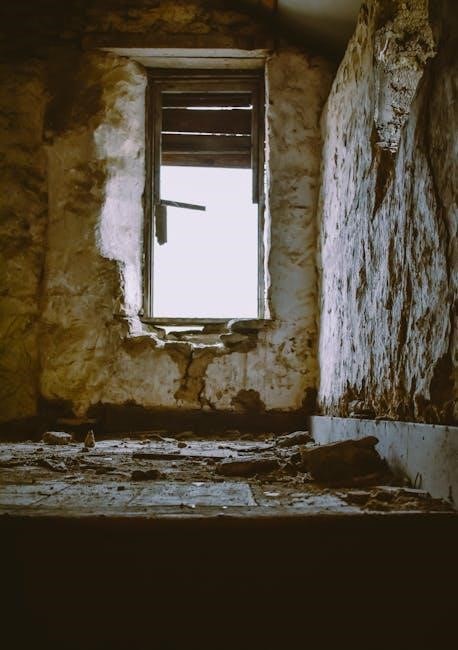
Ruined, a Pulitzer Prize-winning play by Lynn Nottage, explores the harsh realities of war, gender violence, and survival in the Democratic Republic of Congo. Set in a brothel run by Mama Nadi, the play delves into the lives of women caught in the crossfire of conflict, offering a powerful commentary on exploitation and resilience.
Overview of the Play
Ruined, written by Lynn Nottage, is set in a brothel owned by Mama Nadi during the civil war in the Democratic Republic of Congo. The play explores the lives of women survivors of sexual violence, forced into prostitution to survive. Mama Nadi, a complex figure, operates her brothel as a refuge while navigating the brutal realities of war. The play examines themes of gender violence, economic exploitation, and resilience, offering a poignant portrayal of women’s struggles amidst conflict. Winner of the Pulitzer Prize, Ruined sheds light on the human cost of war and the strength of women in the face of unimaginable trauma.
Historical Context of the Democratic Republic of Congo
The Democratic Republic of Congo (DRC) has endured decades of conflict, driven by political instability, ethnic tensions, and the exploitation of natural resources. The civil war, often referred to as Africa’s “world war,” involved multiple nations and militias, leading to widespread violence and displacement. This backdrop of chaos and exploitation is central to Ruined, which highlights the devastating impact of war on women. The play reflects the DRC’s history of colonialism, resource extraction, and gender-based violence, offering a powerful critique of global capitalism’s role in perpetuating conflict. The setting underscores the human cost of war and the resilience of women in the face of unimaginable trauma.
Background on Lynn Nottage
Lynn Nottage is a Pulitzer Prize-winning American playwright born in 1964, known for exploring social justice and the human condition through her work.
Lynn Nottage’s Career and Contributions to Theatre
Lynn Nottage is a Pulitzer Prize-winning playwright known for her groundbreaking contributions to contemporary theatre. Her plays, such as Ruined and Sweat, address systemic inequalities and marginalized voices. Nottage’s career spans over three decades, earning her a Tony Award and MacArthur “Genius” Grant. Her work often explores themes of race, gender, and economic justice, resonating globally. Through her writing, she challenges societal norms and amplifies underrepresented narratives, making her one of the most influential playwrights of her generation. Her contributions have reshaped the theatrical landscape, inspiring new conversations about social justice and human resilience.
Themes and Style in Her Work
Lynn Nottage’s work is distinguished by its unflinching exploration of social justice, resilience, and survival. Her plays often juxtapose gritty realism with poetic dialogue, creating a powerful emotional resonance. Themes of gender violence, economic exploitation, and identity are central to her writing, particularly in Ruined. Nottage’s style blends raw authenticity with lyrical storytelling, offering complex, multidimensional characters. Her ability to humanize marginalized voices has redefined contemporary theatre, making her a vital voice in addressing global injustices. Through her work, she challenges audiences to confront uncomfortable truths while finding hope in the resilience of the human spirit.
Setting and Characters in “Ruined”
The play is set in a brothel in the Democratic Republic of Congo during a brutal civil war. Mama Nadi runs the brothel, offering refuge to women. Key characters include Salima, a traumatized young woman, and Sophie, a resilient survivor. The setting reflects the chaos of war, while the characters embody strength and vulnerability, highlighting the human cost of conflict. The brothel serves as a complex space, blending survival with exploitation, and the characters’ stories reveal the devastating impact of war on women. The dynamics between characters drive the narrative, exploring themes of survival, loss, and resilience. The setting and characters are deeply intertwined, creating a powerful exploration of humanity in crisis.
Mama Nadi and Her Brothel
Mama Nadi, the protagonist, owns a brothel in the Democratic Republic of Congo during a brutal civil war. Her establishment serves as a refuge for women fleeing violence, offering them safety and livelihood. Mama Nadi is a pragmatic, tough, and resourceful figure, balancing business with a protective instincts. The brothel operates as a sanctuary, yet it also reflects the harsh realities of exploitation and survival. Mama Nadi’s complex character blends maternal care with shrewd business sense, as she navigates the moral ambiguities of her trade. Her brothel becomes a microcosm of the war-torn society, where women find both refuge and resilience amidst chaos. Mama Nadi’s strength and humanity define her role as a protector and provider in a world torn apart by conflict.
Key Characters and Their Roles
In Ruined, key characters include Salima, a young woman traumatized by war, and Sophie, a teenager rendered mute by brutalization. Salima’s journey reflects resilience and the emotional toll of conflict, while Sophie’s silence underscores the horrors of sexual violence. Jerome Kisembe, a hustler entangled in the war economy, embodies moral ambiguity and exploitation. These characters, alongside Mama Nadi, drive the narrative, exploring survival, exploitation, and human resilience. Their roles illuminate the broader societal impact of war and gender-based violence, while their interactions reveal the complexities of human relationships in crisis. Each character adds depth to the play’s exploration of survival and exploitation.

Thematic Analysis
Ruined explores themes of gender violence, economic exploitation, and identity, portraying how war disrupts lives and forces survival choices, highlighting the resilience of women in conflict zones.

Gender Violence and War
Ruined vividly portrays the devastating impact of gender violence during wartime, highlighting how women’s bodies become battlegrounds. The play exposes the brutal realities of sexual violence as a weapon of war, illustrating its physical and emotional toll. Characters like Salima and Sophie embody the resilience and trauma of survivors, while Mama Nadi’s pragmatic yet conflicted stance reveals the complexities of survival. Nottage critiques the systemic exploitation of women in conflict zones, where violence is both a tool of domination and a means of exerting control. The play underscores the enduring strength of women amidst unimaginable horrors, offering a poignant commentary on gendered violence in war.
Economic Exploitation and Survival
In Ruined, economic exploitation is deeply intertwined with survival, as war-torn Congo forces women into precarious livelihoods; Mama Nadi’s brothel serves as both a refuge and a site of exploitation, where women trade their bodies for safety and meager income. The play highlights how economic desperation drives individuals to make morally complex choices, blurring the lines between exploitation and survival. The commodification of women’s bodies reflects the broader economic devastation of war, where human life is devalued. Nottage critiques the systems that profit from such exploitation, while also showcasing the resilience of women navigating these harsh realities to sustain themselves and their families.
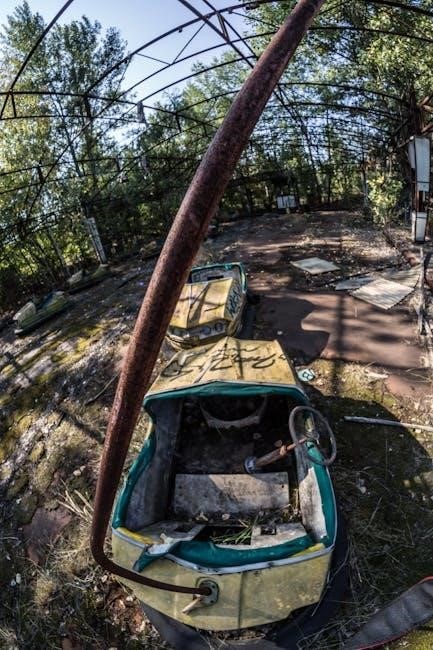
Identity and Resilience
In Ruined, identity and resilience are central to the women’s struggle for survival amidst war and exploitation. Mama Nadi, Sophie, and Salima embody resilience as they navigate their shattered lives, redefining themselves in a world that seeks to erase their humanity. Their identities are shaped by trauma but also by their determination to endure. Through their stories, Nottage highlights the strength of women in the face of unimaginable suffering, showing how they adapt and find ways to reclaim their dignity. Resilience becomes a form of resistance, allowing them to maintain their sense of self even as war seeks to destroy it.
The Brothel as a Space of Conflict and Refuge
The brothel in Ruined serves as both a sanctuary and a battleground, offering refuge from war while perpetuating exploitation and internal strife among its inhabitants.
Mama Nadi’s Role as a Mother Figure
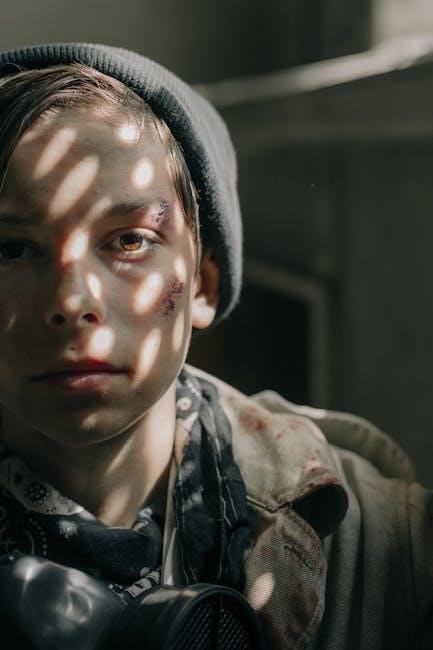
Mama Nadi embodies a complex maternal figure, offering refuge to women in a war-torn Democratic Republic of Congo. While she provides shelter and survival opportunities, her strict control over the women reflects a tough, pragmatic form of care. Her brothel becomes a surrogate family, where she enforces rules to protect them from external dangers. Yet, her harshness often masks a deeper concern for their survival, blending nurturing with exploitation. This duality makes her a pivotal figure, illustrating how survival in conflict zones often requires difficult moral choices. Her role challenges traditional notions of motherhood, blending protection with resilience in a brutal environment.
The Brothel as a Microcosm of Society
Mama Nadi’s brothel in “Ruined” serves as a microcosm of the war-torn society of the Democratic Republic of Congo. It reflects the broader social, economic, and political dynamics, where survival is a constant negotiation. The brothel mirrors the societal hierarchies, with Mama Nadi at the top, exerting control over the women and transactions. It also highlights the exploitation inherent in both the brothel and the larger society, where power imbalances and economic desperation drive human behavior. The brothel becomes a space where the consequences of war—displacement, exploitation, and resilience—are enacted on a smaller scale, offering insight into the larger societal struggles.

Mama Nadi’s Character Depth
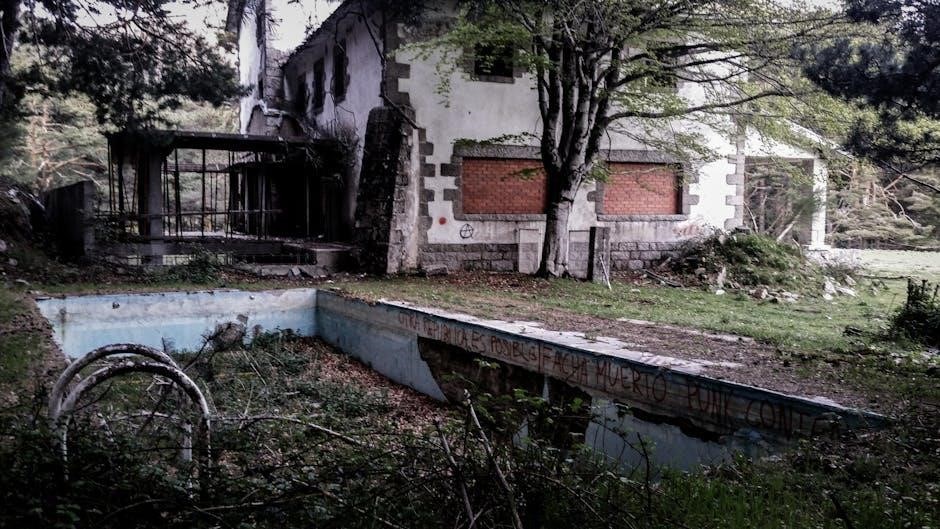
Mama Nadi’s complexity lies in her pragmatic yet compassionate nature, blending toughness with vulnerability. Her ability to thrive in chaos while protecting the women reveals her resilience and humanity.
Her Business Acumen and Morality
Mama Nadi’s business acumen is evident in her ability to navigate the harsh realities of war-torn Congo. She runs her brothel with calculated precision, negotiating with soldiers and traders to ensure survival. Her morality is complex, often pragmatic, as she prioritizes protection and profit over idealistic ethics. While her decisions may seem ruthless, they stem from a deep understanding of the world she inhabits. Her moral code, though flexible, reflects her resilience and determination to thrive in a chaotic environment, making her a multifaceted and compelling character.
Her Relationship with the Women
Mama Nadi’s relationship with the women in her brothel is complex, balancing maternal care with strict control. She provides refuge from the war’s brutality but enforces rules to ensure survival. While some resent her authority, they recognize her efforts to protect them. Her interactions are firm yet layered with emotional depth, reflecting her dual role as both caregiver and enforcer. This dynamic highlights the moral ambiguities of her leadership and her deep understanding of the women’s struggles, making her a flawed yet vital figure in their lives.

The Pulitzer Prize Recognition
“Ruined” won the 2009 Pulitzer Prize for Drama, honoring its powerful portrayal of war’s impact on women. This prestigious award underscored the play’s cultural and artistic significance.
Significance of the Award
The Pulitzer Prize for Drama, awarded to Ruined in 2009, underscores the play’s profound impact and artistic excellence. This prestigious recognition highlights Lynn Nottage’s ability to address urgent social issues through compelling storytelling. The award draws attention to the play’s unflinching portrayal of gender violence and war, amplifying its relevance globally. By honoring Ruined, the Pulitzer Prize acknowledges Nottage’s contribution to shedding light on the untold stories of women in conflict zones. The award also solidifies the play’s place in contemporary theatre, ensuring its themes of survival and resilience resonate widely. It remains a landmark work in theatre history.
Impact on the Play’s Visibility
The Pulitzer Prize significantly elevated Ruined’s visibility, bringing global attention to Lynn Nottage’s work. The award sparked widespread interest, leading to numerous productions worldwide. Theatres and audiences embraced the play, fostering conversations about its themes. Its inclusion in academic curricula increased, introducing it to new generations. The play’s availability in PDF and digital formats further expanded its reach. The recognition also highlighted the importance of addressing gender violence and war, making Ruined a cornerstone of contemporary theatre. Its visibility continues to grow, ensuring its message resonates globally and inspires dialogue on critical human rights issues.
Critical Reception and Reviews
Lynn Nottage’s Ruined received widespread critical acclaim for its powerful storytelling and unflinching portrayal of gender violence. Critics praised the play’s emotional depth and well-crafted characters, highlighting its ability to spark necessary global discussions on human rights and resilience.
Academic and Theatrical Responses
Scholars and theatre practitioners have praised Ruined for its raw authenticity and emotional impact. Academics highlight its exploration of gendered violence, while theatrical productions have been celebrated for their immersive storytelling. The play is widely studied in university curriculums, sparking discussions on trauma, survival, and resilience. Its ability to blend harsh realities with moments of humanity has made it a cornerstone of contemporary theatre. Performances have been met with emotional audiences, underscoring its universal relevance. The play’s theatrical success lies in its balance of drama and social commentary, making it a powerful tool for both education and artistic expression.
Controversies and Debates
Ruined has sparked debates due to its graphic portrayal of sexual violence and war’s impact on women. Critics argue that while the play raises awareness about gender-based atrocities, it risks sensationalizing trauma. Some question whether the brothel setting perpetuates stereotypes of African women as victims. Others debate the moral ambiguity of Mama Nadi’s business, questioning whether her survival tactics justify exploitation. The play’s unflinching realism has divided audiences, with some praising its honesty and others finding it emotionally overwhelming. These controversies highlight the complexity of addressing such sensitive issues in theatre, challenging both creators and viewers to confront uncomfortable truths.
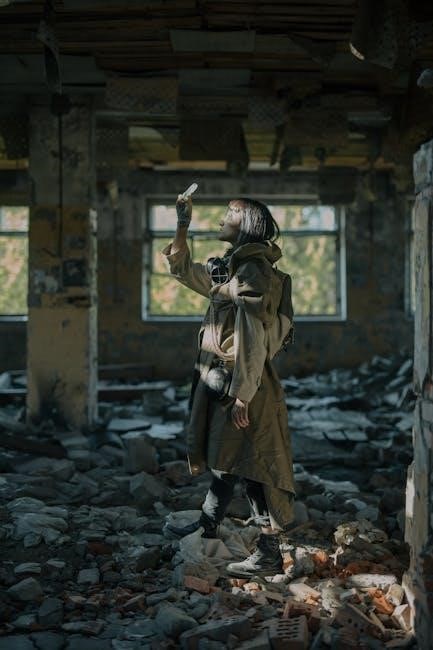
Global Relevance of the Play’s Themes
The play’s themes of war, gender violence, and economic exploitation resonate globally, addressing universal human experiences and fostering dialogue on social justice and human rights worldwide.
War, Gender, and Economic Exploitation
Lynn Nottage’s Ruined vividly explores the intersection of war, gender, and economic exploitation, set against the backdrop of the Democratic Republic of Congo’s conflict. The play highlights how war disproportionately affects women, turning their bodies into battlegrounds and forcing them into survival strategies. Economic exploitation is deeply intertwined, as resources like minerals fuel the conflict, while women are exploited for labor and sex. Nottage portrays how systemic oppression and violence are normalized, yet also reveals the resilience of women who navigate these horrors. The play underscores the global relevance of these issues, showing how war and exploitation are not isolated but deeply connected to broader societal structures.
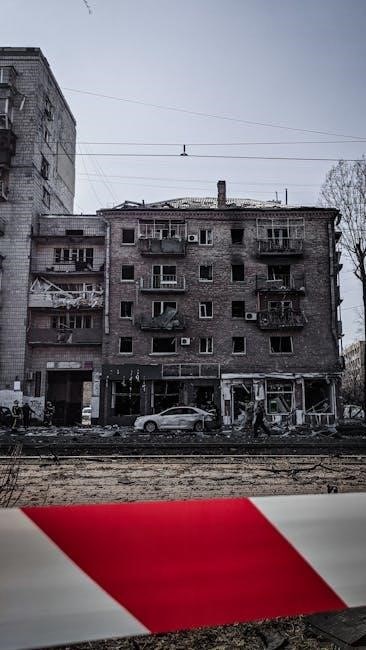
Universal Appeal of the Story
Lynn Nottage’s Ruined transcends its specific setting, resonating universally through its exploration of human resilience and survival. The play’s themes of hope, loss, and the struggle to maintain dignity in the face of chaos are deeply relatable. While rooted in the Democratic Republic of Congo’s conflict, the emotional and moral complexities of the characters’ journeys speak to audiences worldwide. The story’s focus on human connection and the will to endure, despite unimaginable hardships, creates a profound emotional resonance. This universality ensures that Ruined is not just a story about war-torn Africa but a reflection of the global human experience.
Ruined by Lynn Nottage stands as a powerful testament to resilience, humanity, and the enduring impact of war. Its unflinching portrayal of survival and hope ensures its lasting relevance.
Legacy of “Ruined”
Lynn Nottage’s Ruined has left an indelible mark on contemporary theatre, shedding light on the horrors of war and gender violence. Its unflinching portrayal of resilience has sparked global conversations, inspiring adaptations and academic studies. The play’s Pulitzer Prize win elevated its status, making it a landmark work in exploring the intersection of war, economy, and identity. Its legacy lies in its ability to humanize victims of conflict and challenge societal norms, ensuring its relevance for future generations. Ruined continues to influence theatrical and literary discourse, cementing Nottage’s role as a visionary storyteller and advocate for social justice.
Final Thoughts on the Play’s Importance
Ruined remains a powerful testament to the resilience of women in war-torn regions, offering a searing critique of gender violence and economic exploitation. Its unflinching portrayal of survival and humanity in the face of atrocities ensures its relevance. The play not only educates audiences about the Democratic Republic of Congo’s turmoil but also fosters empathy and understanding. Nottage’s masterful storytelling highlights universal themes, making the play a vital tool for sparking conversations about justice, dignity, and the strength of the human spirit. Its importance lies in its ability to challenge audiences to reflect on global inequalities and the enduring impact of conflict.